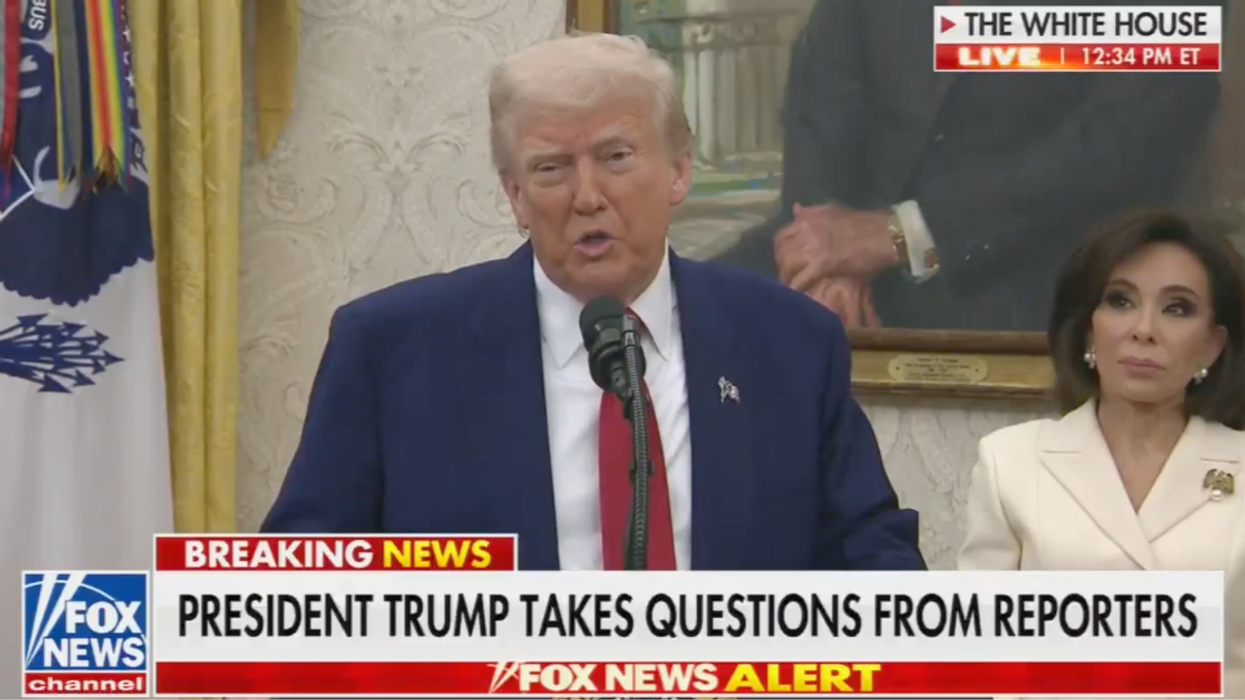President Donald Trump was widely criticized after he lashed out at Wall Street analysts over their new "TACO" acronym insult, which stands for "Trump Always Chickens Out."
The acronym refers to Trump’s pattern of announcing sweeping tariffs that initially rattle financial markets and drive stock prices down, only to later soften or reverse course, prompting a rebound in investor confidence and market gains.
A reporter asked Trump the following:
“Mr. President, Wall Street analysts have coined a new term called the ‘TACO Trade’ — they’re saying ‘Trump Always Chickens Out’ on your tariff threats, and that’s why markets are higher this week. What’s your response to that?”
Trump gave the following, rambling response:
“Oh, isn’t that — I chicken out, I’ve never heard that. You mean because I reduced China from 145%, [then] I said down to 100, then down to another number?"
“And I said you have to open up your whole country and because, I...I gave the European Union a 50% tax tariff, and they called up and they said, ‘Please, let’s meet right now, please, let’s meet right now.’ ... You call that chickening out?”
“This country was dying. You know, we have the hottest country anywhere else in the world. I went to Saudi Arabia, the king told me, he said, ‘You got the—’ we have the hottest country in the world right now."
"Six months ago, this country was stone-cold dead. We had a dead country. We had a country we didn’t think was going to survive, and you ask a nasty question like that.”
Trump defended his recurring tariff threats by saying, “It’s called negotiations,” adding that the United States has been “very nice to China.”
Then he attacked the reporter who asked him the question remarking:
“But don’t ever say what you said. That’s a nasty question. To me, that’s the nastiest question.”
You can hear what he said in the video below.
Trump was called out after footage of his tantrum went viral.
Trump’s comments came in the wake of a federal trade court decision on Wednesday that blocked his attempt to impose sweeping tariffs under a rarely used emergency-powers law—delivering a significant blow to one of the cornerstones of his economic agenda.
The ruling by a three-judge panel from the U.S. Court of International Trade in New York cast immediate doubt on the legality of Trump’s tariff strategy, which has unsettled global markets, strained relationships with trade partners, and fueled concerns about inflation and a possible economic slowdown.
The court’s decision followed multiple lawsuits arguing that Trump had overstepped his authority by bypassing Congress and unilaterally reshaping trade policy. While tariffs typically require congressional approval, Trump has insisted that he can act independently to address what he describes as a national emergency caused by persistent trade deficits.














 @DuncanCecil/X
@DuncanCecil/X @@realDonaldTrump/Truth Social
@@realDonaldTrump/Truth Social @89toothdoc/X
@89toothdoc/X @xray_media/X
@xray_media/X @CHRISTI12512382/X
@CHRISTI12512382/X
 @sza/Instagram
@sza/Instagram @laylanelli/Instagram
@laylanelli/Instagram @itssharisma/Instagram
@itssharisma/Instagram @k8ydid99/Instagram
@k8ydid99/Instagram @8thhousepath/Instagram
@8thhousepath/Instagram @solflwers/Instagram
@solflwers/Instagram @msrosemarienyc/Instagram
@msrosemarienyc/Instagram @afropuff1/Instagram
@afropuff1/Instagram @jamelahjaye/Instagram
@jamelahjaye/Instagram @razmatazmazzz/Instagram
@razmatazmazzz/Instagram @sinead_catherine_/Instagram
@sinead_catherine_/Instagram @popscxii/Instagram
@popscxii/Instagram
